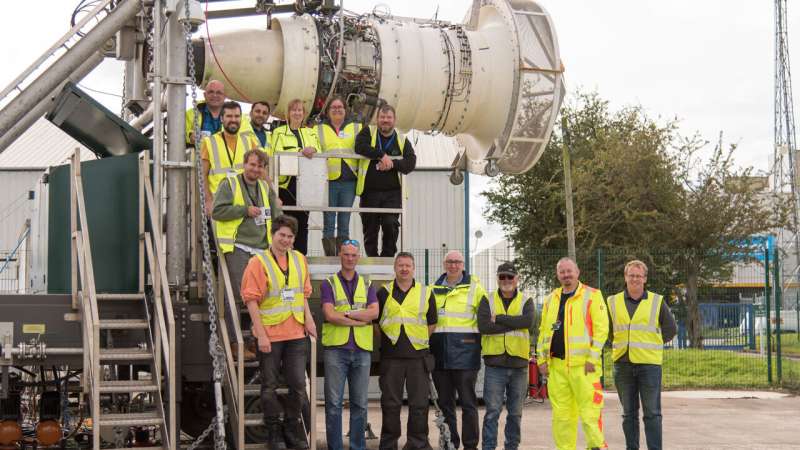Using sustainable aviation fuels could reduce emissions by up to 80%, scientists find

A team of scientists have completed tests to quantify the emissions from the combustion of sustainable aviation fuels, revealing a profound reduction when compared to regular jet fuel.
Researchers from the National Center for Atmospheric Science (NCAS), including those from the University of Manchester, compared standard jet fuels with several different blends of sustainable aviation fuel, including fuels supplied by Neste.
They monitored the emissions produced by two different engines, included those used on the FAAM Airborne Laboratory’s BAe-146-301 aircraft using CFS Aero facilities at Hawarden Airport.
The aviation sector was responsible for more than 2% of global greenhouse gas emissions in 2021, but sustainable aviation fuel has the potential to reduce climate-changing greenhouse gas emissions—such as carbon dioxide—in aviation by up to 80% when compared to standard jet fuel. It also has the potential to benefit local air quality.
Findings from the research found that emissions of ultrafine black carbon at low thrust, which directly impacts local air quality, was 45% less in number and 80% less in mass for every kilogram of blended sustainable aviation fuel burnt.
The results could help reduce the climate warming effects of aviation globally.
Dr. Paul I Williams, NCAS research scientist based at The University of Manchester, said, “As aviation and the UKRI funding bodies move towards carbon neutral, it is important to understand what effects these alternative fuels have. This study is really important to understand these effects and to provide the U.K. with capability to make these assessments in the future as new fuels and technologies are developed.”
Sustainable aviation fuel is made from renewable biomass and waste resources and can be used as a direct replacement for jet fuel sourced from crude oil. These fuels are blended with standard jet fuels so they are compatible with all current aircraft, including the FAAM aircraft.
The goal is by 2050, all jet fuels will be 100% synthetic and not from fossil fuels.
“This study is really important to understand what effects these alternative fuels have and to provide the U.K. with capability to make these assessments in the future as new fuels and technologies are developed,” says Dr. Paul I Williams.
The ground-based engine testing enabled the team to detect a range of air pollutant emissions created by the combustion of blended aviation biofuel and HEFA fuel—to compare emissions between fuels from sustainable and non-sustainable sources.
The chemical and physical properties of emitted gases and particles—such as carbon dioxide, carbon monoxide, nitrogen oxides, and suspended small particles—were evaluated.
Using a sample probe developed by SCITEK, and equipment from The University of Manchester, Cardiff University and York University, emissions were measured within the engine exhaust.
Dr. Williams added, “As part of the ground-based engine testing we sampled emissions of ultrafine black carbon, also known as non-volatile particulate matter. Non-volatile particulate matter emissions from aircraft engines at low thrust directly impact local air quality near the earth’s surface, and the people who live and work nearby airports. The testing shows that at low thrust, for every kilogram of blended sustainable aviation fuel burnt, there is approximately 45% less in number and 80% less in mass of non-volatile particulate matter.
“At cruise thrusts, we found that there were also lower amounts of non-volatile particulate matter being emitted from the burning of sustainable aviation fuel. This indicates that while an aircraft is cruising there would be less non-volatile particulate matter produced, which in turn impacts contrail formation. This could have the potential to reduce the climate warming effects of aviation globally.”
Using sustainable aviation fuel, as well as adopting a range of other sustainable practices, is a quick way to reduce carbon emissions from aviation, which includes the U.K. research aircraft and operations.
The study follows on from the world’s first in-flight emissions study, which recently made its first flight using a blend of sustainable aviation fuel.
Alan Woolley, head of the NCAS-managed FAAM Airborne Laboratory, said, “For NCAS and the FAAM Airborne Laboratory, the results from this emissions-testing work will inform decisions around investment and the use of sustainable aviation fuel for future airborne science missions around the world.
“The aviation sector will be able to use our data to improve sector-wide understanding of the gases and particles released from gas turbine engines—of the size used on the FAAM Airborne Laboratory’s research aircraft.”
Citation:
Using sustainable aviation fuels could reduce emissions by up to 80%, scientists find (2023, October 13)
retrieved 13 October 2023
from https://techxplore.com/news/2023-10-sustainable-aviation-fuels-emissions-scientists.html
This document is subject to copyright. Apart from any fair dealing for the purpose of private study or research, no
part may be reproduced without the written permission. The content is provided for information purposes only.
For all the latest Technology News Click Here
For the latest news and updates, follow us on Google News.

